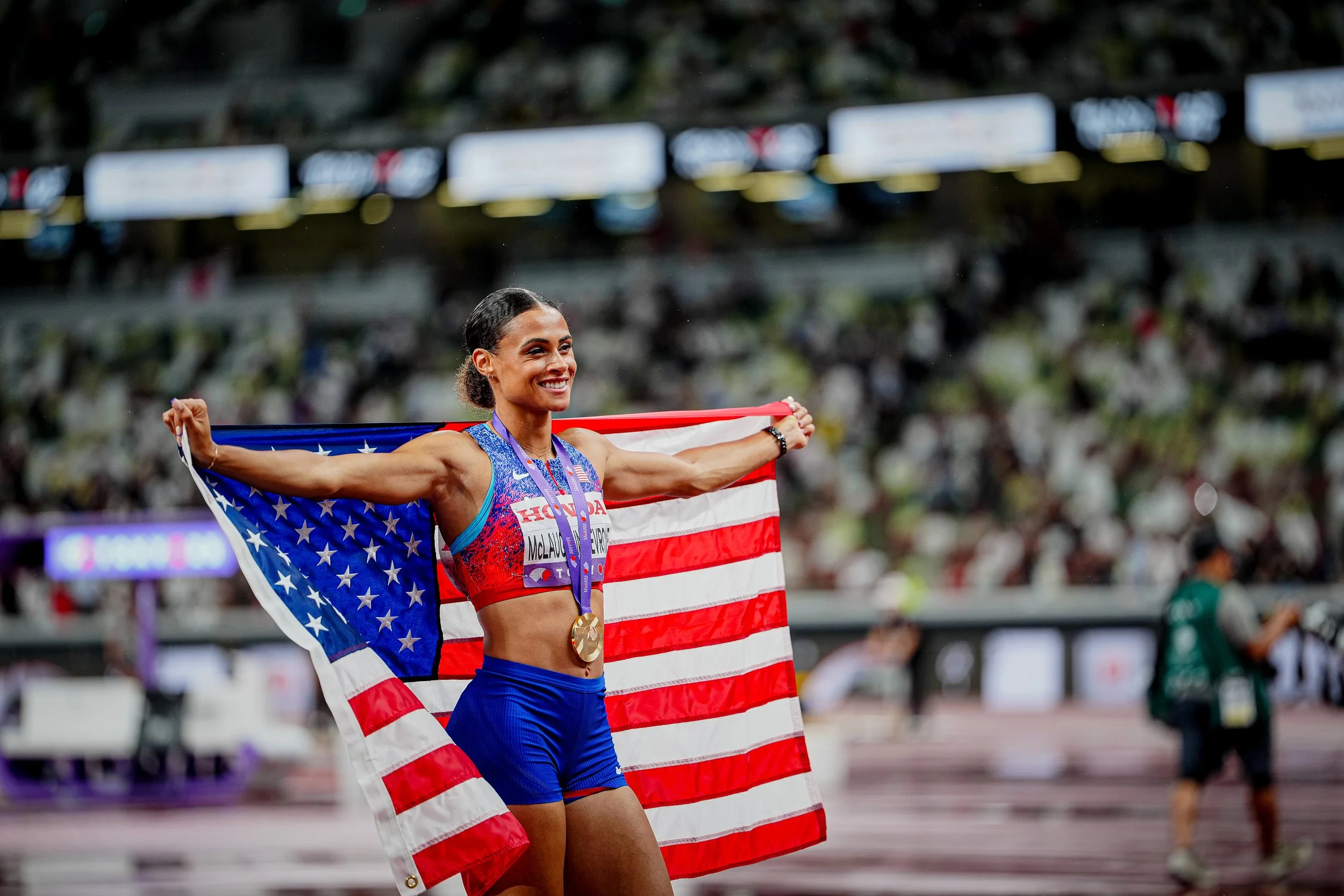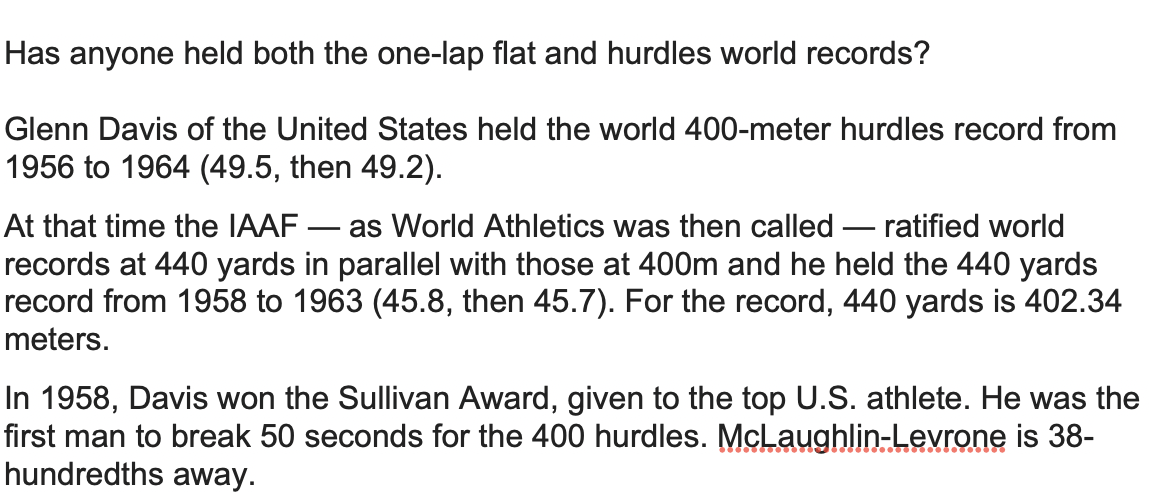TOKYO – For nearly 40 years, the world record in the women’s 400 meters, maybe the most basic race there is, one lap around the track, has seemed — beyond.
A great many people have thought for a very long time that the mark, 47.60 seconds, is suspect. It was run by a woman from what was then East Germany, Marita Koch. If you know anything about track, it’s harder to run fast in the inside lanes. The turns are tighter. The force on the body is that much more.
Sydney McLaughlin-Levrone at the finish line Thursday night / World Athletics
If not suspect, 47.60 seconds — being generous — was always an anomaly. Koch ran 47.60 in Lane 2, at a meet in October 1985 in Canberra, Australia.
After the fall of the Berlin Wall, it became clear that the East German authorities had doped runners and swimmers in service of the state. Koch has said she never failed a test – though that proves nothing. She has consistently said she did nothing wrong.
She said, in one of the very few interviews she has given over the years: “Also, all world records are certainly in some way an exception, so now the next person has to come, or has to be born, who is ready to break the record. At some point, that time will come.”
The time is not yet now. But it’s near.
Sydney McLaughlin-Levrone, born in 1999, 26 years old, ran the 400 in 47.78 seconds, a world championship and American record. Marileidy Paulino of the Dominican Republic, the Paris 2024 Olympic and 2023 world champion, took second, in 47.98.
“It definitely was a challenging race,” McLaughlin-Levrone said afterward, adding a moment later, “I’m really grateful for the result. Amazing night.”
Until Thursday, only two women had gone under 48, both from the 1980s — Koch and Jarmila Kratochvilová of what was then Czechoslovakia. In 1983, at a race in Munich, Kratochvilová ran 1:53.28 in the 800. That is still the world record. No one has come close.
A couple weeks after Munich, at the 1983 worlds in Helsinki, Kratochvilová, running the 400, went 47.99.
Until Thursday, that was the championship record. On Thursday, Paulino went one-hundredth faster and took second.
“I broke the 48-second barrier,” Paulino said, speaking in Spanish, “so I think I have what it takes to break the world record.”
Courtesy Mark Butler BBC track and field statistician
Salwa Eid Naser of Bahrain, the 2019 world champion and Paris 2024 silver medalist, took third, in a season-best 48.19. That time would have won the last two world championships.
As in Paris last year, all nine women in Thursday’s final broke 49 seconds. Only 15 have gone under 49 in the history of the women’s 400.
The super shoes that are now prevalent in track and field have indisputably changed the game. So, too, better nutrition and training. Caveat, and for emphasis speaking generally not referring to anyone specific in Thursday’s race: the skeptic should always be wary, given the sport’s history, of nefarious in track and field.
McLaughlin-Levrone is now the first woman ever to win a world title in both the 400 hurdles and flat.
McLaughlin-Levrone – she married Andre Levrone Jr. in 2022 – is arguably the greatest ever in the 400 hurdles. She made the 2016 U.S. Olympic team, at 16 going on 17. She won gold in the race at the 2021 Games here in Tokyo and in Paris in 2024 and at the 2022 world championships in Eugene, Oregon. She holds six of the top 10 400 hurdles times. She was the first woman to break 52 seconds (2021) and then 51 (2022). At those 2024 Games, she set – another – world record, 50.37.
In 2023, McLaughlin-Levrone ran the 400 flat at the U.S. championships. She won. She did not, however, go on to race at the 2023 worlds, in Budapest, with what was described as a knee injury.
This year, like 2023 not an Olympic year, McLaughlin is back in the 400 flat.
McLaughlin-Levrone’s 400 flat timeline starts in 2014, when she was a junior: 53.78.
In 2021, 51.16.
Two years later, she was two, heading toward three, seconds faster.
At the 2023 U.S. nationals, once more in Eugene, she won, in 48.74, a then-personal best — just off the American record, 48.70, set in 2006 by Sanya Richards-Ross.
Richards-Ross is the 2012 London 400 champion and the Beijing 2008 silver medalist.
For McLaughlin-Leverone, this season has seen steady progression.
In Jamaica in April, McLaughlin-Levrone ran 50.32; in Miami in May, 49.69; in Eugene in July, 49.43; at the U.S. nationals, in early August again in Eugene, 48.9.
At those August nationals, McLaughlin-Levrone told reporters, “Everyone talks about the American record, of course, but that’s going to come. I think this year and this event has taught me patience. I’ve learned a lot about myself and I’ve learned a lot about the 400.”
After the first round here in Tokyo, 49.41, she said, “I was focused on the first half of the race tonight and ran it well. I did it relaxed.”
Compare: after her first round here, Naser, 49.13, fastest in the heats, a few ticks ahead of McLaughlin-Leverone, said, “The women’s 400 meters is really competitive at the moment. but that is healthy and sweet because we push ourselves all the time. You cannot compete and be relaxed. You need to step up your game.”
Two nights ago here in Tokyo, in the 400 semifinals, McLaughlin-Levrone was so relaxed she appeared to be jogging the homestretch.
Her time: 48.29. A new American record.
In a stroke of serendipity, the 48.29 came exactly 19 years to the day that Richards-Ross had run her 48.70.
Richards-Ross filed a lengthy post Wednesday to her social media accounts that read, in part, “On this day, 19 years ago, I ran the fastest 400m race by an American and on its anniversary, almost like a fairytale ending, the great @sydneymclaughlin16 breaks it. 🤝🏾🥇💫”
That post went on to say of holding a record for 19 years: “It was like you were this invisible giant always still on the line, being chased by the best of the best!”
Invisible giant? 19 years?
The Koch record is just days shy of 40.
Courtesy Mark Butler
The issue Thursday was not whether McLaughlin-Levrone would win. That was assumed.
It was 47.60.
It started raining over Olympic Stadium, on and off, a couple hours before the race. The track was slick.
McLaughlin-Levrone went out hard from the blocks.
At 100 meters, she was more than one-tenth up. Halfway, the way they would finish was clear, Paulino second, Naser third.
Paulino closed with a vengeance. McLaughlin-Levrone held her off with a final 100 in 12.91.
“I think barriers are broken when the time is right. Records come when they are supposed to,” McLaughlin-Levrone said of 47.60, adding, “To walk away with this title in an event that’s not mine, I’ll take it.”
Naser, in third, said, “I think records are made to be broken.”
This. after referring to what just went down on a rainy Thursday night in Tokyo, saying, “Wow, you saw the times?!”





